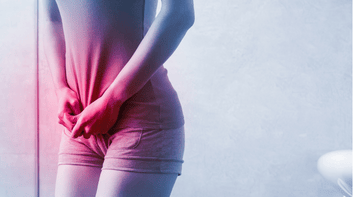
Normally, your urinary tract – the urinary bladder, kidneys or the tubes connecting them – is a sterile environment through which your urine passes on its way out. But if it gets infected with harmful bacteria, you’re in for a miserable few days! Unless you’re one of the few women who have never had a (UTI), you probably already know what it feels like. You might feel a frequent need to pee, yet pass little urine when you go. Your urine might be cloudy, blood-tinged, and strong-smelling.
UTIs are unfortunately very common, and women are at a higher risk of UTIs than men. If you get a UTI more than twice in six months, or three or more times in one year, it is considered to be a recurrent urinary infection. About 1 in 4 women experience recurrent UTIs (RUTI). One UTI is bad enough, but recurring infections can be a frustrating, painful cycle that can take a toll on your life.
Why does my UTI keep coming back?
If you are getting UTIs too often, it does not mean you are doing something wrong, or you’re at fault. Some women are just more prone to UTIs. Genes play a role here as well. If you have a mother or sister who gets frequent UTIs, it could be a risk factor for you. Other risk factors depend on your age and lifestyle. Before menopause, the most common risk factor is sexual intercourse. Certain medical conditions like diabetes, or kidney stones can also increase the risk of UTIs.
After menopause, the change in your hormones thins out the lining of your urinary tract and your body’s normal defence mechanisms go down. The numbers of the good bacteria – Lactobacilli – in the vagina naturally decline. As you age, your bladder also contracts less strongly than it once did, making it more difficult to empty it completely. All these factors can contribute to increased risk of recurring UTIs.
If you are getting frequent UTIs, make sure to see a doctor. Sometimes what seems like an UTI may be something else – like a kidney stone or a bladder condition. Your doctor will be able to rule these out, and provide you with the right treatment.
How can I stop frequent UTIs?
Even after going through the prescribed antibiotic treatment, does the UTI keep coming back. The key to treating recurring UTIs is identifying what exactly is causing the infections, and addressing those factors to prevent recurring infections. There are also things you can do to prevent recurring urinary infections:
· Drink plenty of water – the fluids help flush out your bladder and the bad bacteria. You should be having 6 to 8 glasses of water every day
· Urinate regularly – don’t hold your pee for too long, or go more than 4 hours without peeing, to prevent the growth of bacteria anywhere in your urinary tract.
· Empty your bladder as soon as possible after having sex. There is some evidence that peeing after sex can help flush out harmful bacteria and reduce the risk of UTI
· Avoid using harsh soaps, or vaginal washes marketed for ‘intimate areas’ – they only increase the risk of UTIs.
· Consider vaginal estrogen therapy – it has been shown to reduce the risk and recurrence of UTIs in postmenopausal women
